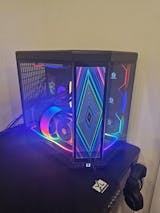There are essentially two distinct methods for cooling your computer: liquid metal cooling and standard stock cooling. Both approaches have their advantages and disadvantages; ultimately, it comes down to personal preference. To further assist you in making a selection for your personal computer, this article will compare and contrast liquid metal cooling with standard stock cooling.
Liquid Metal Cooling
What Exactly Is Liquid-Metal Cooling?
Liquid metal cooling is an innovative and specialized approach to cooling that substitutes a liquid metal compound, often made of gallium and other metals, for conventional thermal paste. Because of its high thermal conductivity, this liquid metal can outperform traditional thermal pastes.
Advantages of Liquid Metal Cooling:
-
Liquid metal compounds have excellent thermal conductivity, allowing for rapid heat dissipation from the central processing unit (CPU) or graphics processing unit (GPU) to the heatsink. As a result, temperatures may drop, leading to enhanced functionality.
-
Unlike conventional thermal pastes, which might dry out or degrade over time, liquid metal compounds tend to retain their effectiveness for a longer period of time. The thermal compound won't need to be reapplied as often.
-
Low Upkeep: Once implemented, liquid metal cooling needs just occasional attention. It maintains its potency and stability for long stretches of time.
Drawbacks of Liquid Metal Cooling:
-
Liquid metal is difficult to apply since it is conductive and might cause damage to your electronics if it spreads. It's essential to apply with care.
-
Liquid metal may not work with all CPU/GPU configurations due to incompatibilities with other materials. Before putting it to use, be sure it's compatible.
-
Budgetary considerations may arise due to the higher cost of liquid metal compounds compared to more conventional thermal pastes.
Regular Stock Cooling
Stock cooling means what exactly?
A CPU or GPU's "stock cooling" is the cooling system that was designed specifically for it. These are normally a heatsink and fan, however liquid cooling solutions are also an option. Stock coolers strike a compromise between performance, noise, and cost to effectively cool your components.
Advantages of Regular Stock Cooling:
-
Simple Setup & Operation Stock coolers are intended to be as user-friendly as possible. The majority of these can be implemented with little more than a plug and a little of knowledge.
-
Stock coolers are offered at no extra cost with the purchase of a CPU or GPU, making them a cost-effective option.
-
Unlike the use of third-party cooling solutions, which may void the warranty on your CPU or GPU, utilizing the OEM cooler often does not violate the warranty.
Drawbacks of Regular Stock Cooling:
-
Stock coolers are made for mass production, therefore they may not provide the best cooling for demanding tasks like overclocking or professional gaming.
-
Stock coolers might be louder than aftermarket cooling systems, which can be an issue for those who value silence in their computing environments.
-
The heat produced by high-end CPUs and GPUs may be too much for the stock cooling to manage, resulting in overheating and possible thermal throttling.
Choosing the Right Cooling Solution
Whether you go for liquid metal cooling or traditional stock cooling relies on your individual circumstances. To aid in your decision-making, please consider the following:
-
Liquid metal cooling may provide superior thermal performance if you are an enthusiast or gamer who is pushing the limits of your components.
-
Stock cooling is the more cost-effective option because it already exists in your system.
-
Stock cooling is the way to go if you don't feel confident using liquid metal and want a quick and painless fix.
-
Component Compatibility: Before purchasing, check to see if your CPU/GPU is compatible with the cooling technique you intend to use.
In sum, both liquid metal and standard stock cooling have their advantages and disadvantages. Prior to choosing a choice, it's important to take into account your individual requirements, financial constraints, and amount of experience with installations. No matter what you choose with, cooling is essential for the health and performance of your PC parts.















